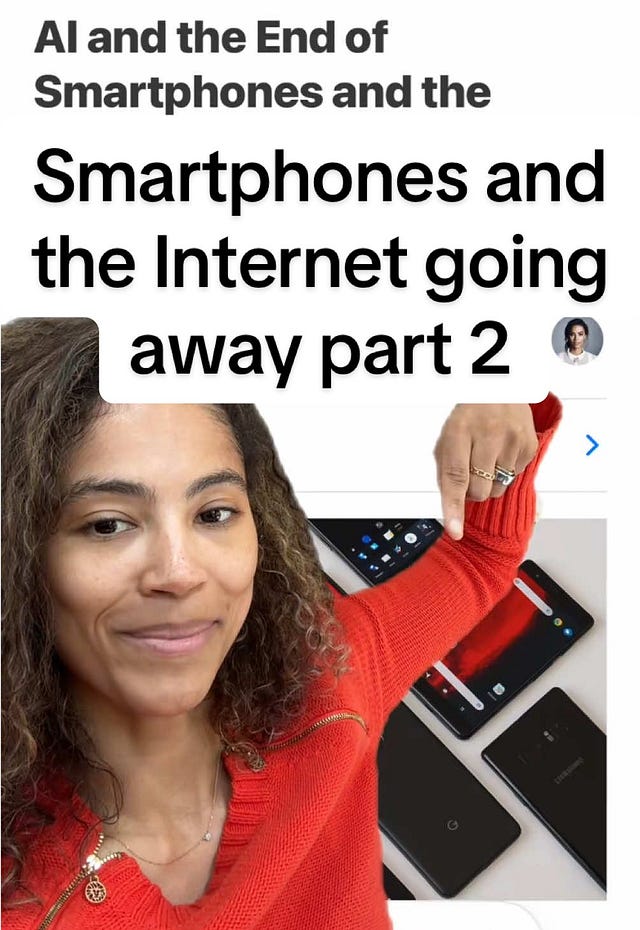Will New AI Tech Have Unintentional Bias? - DINT 154
AI agents rise as a key development in the human-less Internet according to AI expert Sinead Bovell. Will these automated tools act properly on our behalf, or will they reflect cultural biases?
Will AI Agents Sabotage Black People? - DINT 154
AI futurist says to prepare for a human-less Internet
Digital agents will search the Internet for us and customize info to meet our specifications
Apple and Meta and other tech companies are moving away from handheld devices and towards search-enabled eyeglasses
Will tech companies copy and paste the same systems that gave rise to a slew of racist incidents from AI technology?
One of my favorite AI futurists is Sinead Bovell. You may have seen her in previous editions of DINT, sharing her insights on teaching and AI in classrooms. Today she published an article that gave rise to several questions for me.
The main points of her article are that:
AI agents will conduct much of the work we now do online to search for things and
Smartphones will soon be a thing of the past, replaced possibly by AI-enabled glasses.
These two predictions, while completely plausible, give me pause. Since they are likely to happen, I wonder just how far we’ve come with AI technology. Has our humanity caught up to AI development or will we repeat the same ugly incidents that marked the early days of mass-adoption of AI tech?
In case you forgot, here’s a quick rundown of the more egregious things that took place in the last 10 years:
2009 - HP Blames Faulty Facial Recognition on Standard Algorithm
2015 - Google Photo's Algorithm Tags Black People as Gorillas
2019 - Google Cuts Corners to Trick People of Color into Giving Up Biometric Data
Facial recognition needs a category of its own:
2024 - Detroit Police Department and ACLU reach agreement over use of facial recognition technology
2024 - City Police to Pay Detroit Father $300k for Facial Recognition False Arrest
2025 - Detroit woman suing police, claiming faulty facial recognition technology led to unjust arrest
The two advances Bovell points out, human-less Internet searches and AI-enabled glasses instead of smartphones could expand the damage previous missteps have caused.
Due to faulty programming, will an AI agent refuse to book me on a luxury getaway because no one else in my demographic has booked before? Will AI-enabled glasses misidentify me as a suspect of interest in a crime? Or worse yet, will the AI glasses identify me as another person, or not as a person at all, as in the case of Google Photos identifying Black people as gorillas in its algorithm?
This paints a bleak picture but one we must be prepared for. Let’s continue to call out tech development that negatively affects us. It’s the only way to ensure humanity somehow catches up to technological development.
Here’s the article by Sinead Bovell:
More News at the Intersection of Tech Race and Gender
In a world first, Brazilians will soon be able to sell their digital data
Brazil is testing a digital wallet program that allows users to monetize their data. A federal bill, when passed, would turn data into commercial assets for citizens — the first such proposal in the world. The pilot, a partnership between the public and private sectors, is ahead of similar initiatives in some U.S. states.
Source: Rest of World
ICE Taps into Nationwide AI-Enabled Camera Network, Data Shows
Flock's automatic license plate reader (ALPR) cameras are in more than 5,000 communities around the U.S. Local police are doing lookups in the nationwide system for ICE.
Source: 404 Media
DOGE Is Building a Master Database to Surveil and Track Immigrants
DOGE is knitting together data from the Department of Homeland Security, Social Security Administration, and IRS that could create a surveillance tool of unprecedented scope.
Source: Wired










I know that the Jetsons will be glad we prepared Rosie to be better prepared